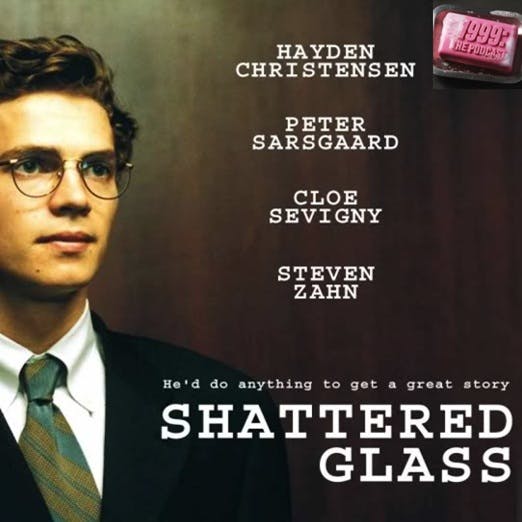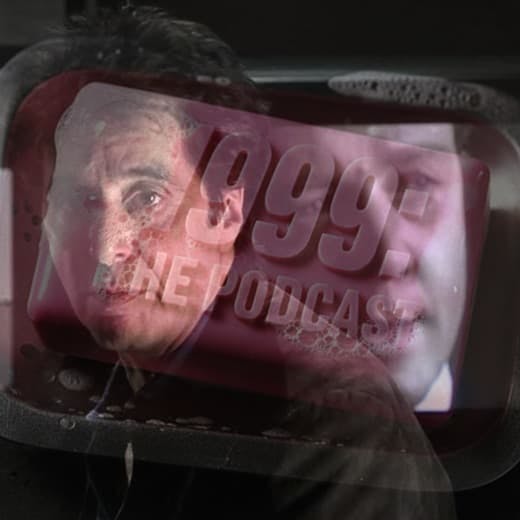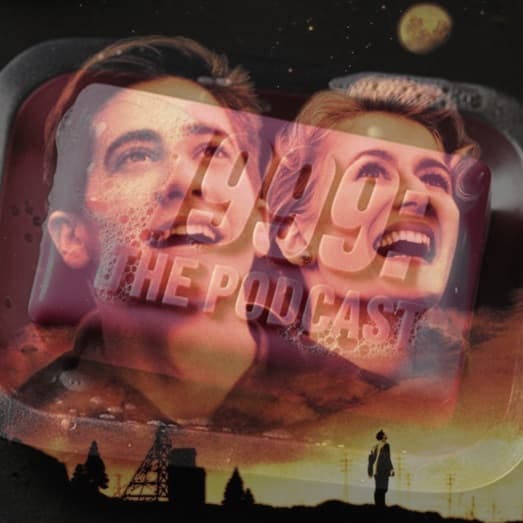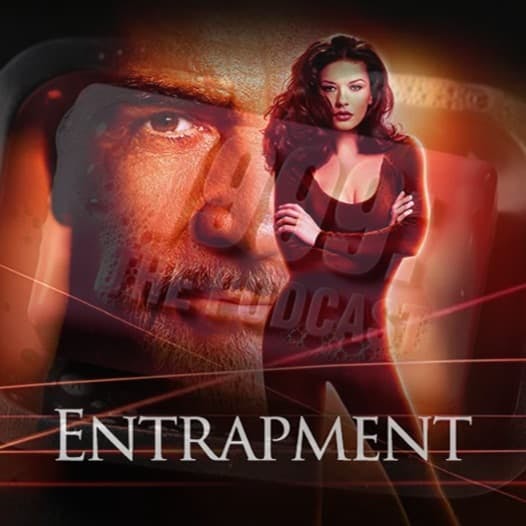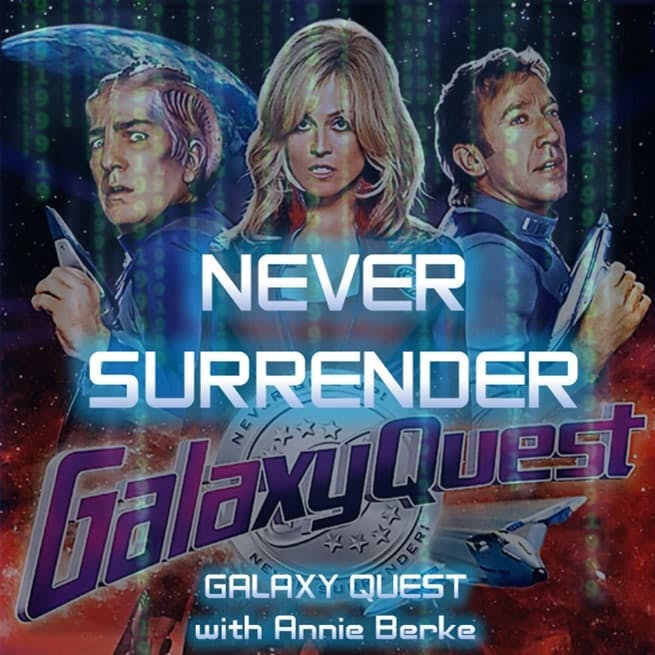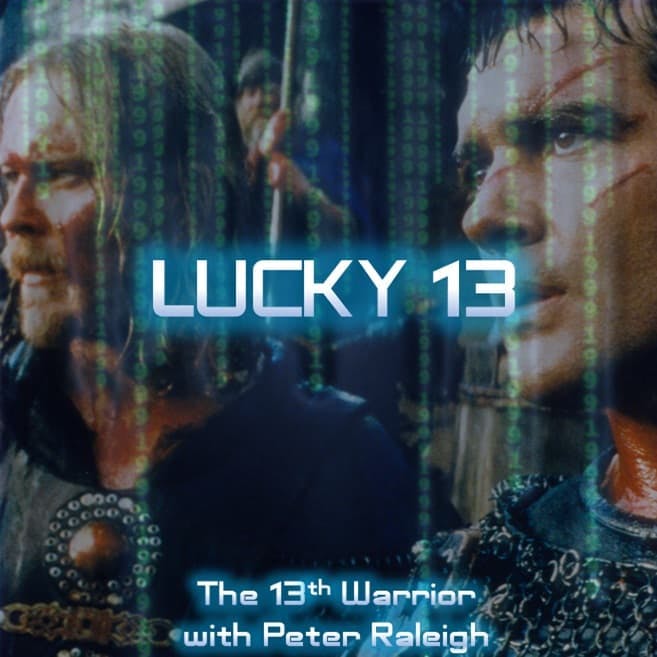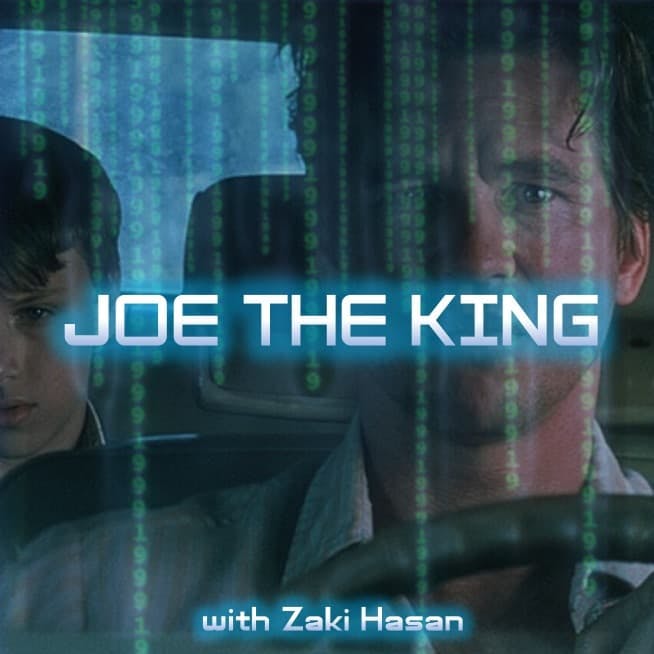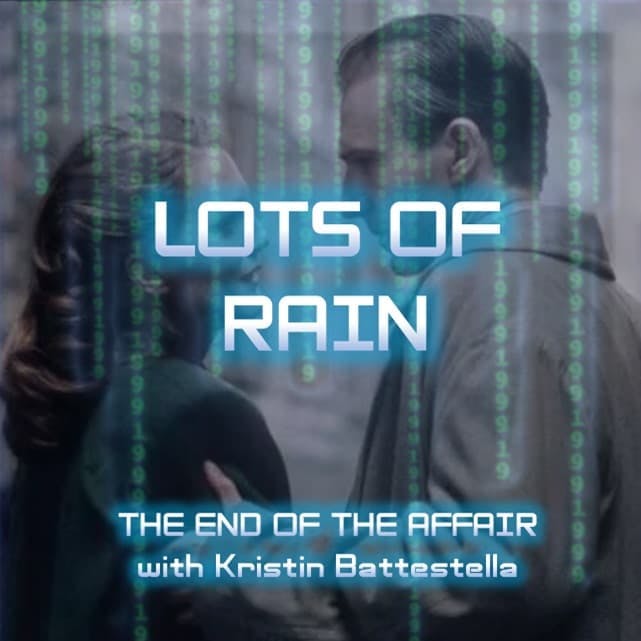Discover 1999: The Podcast
1999: The Podcast

 1999: The Podcast
1999: The Podcast
Author: John Brooks and Julia Sirmons
Subscribed: 10Played: 692Subscribe
Share
℗ & © 2022 The CageClub Podcast Network
Description
Was 1999 the best year in movie history? We think it might be!
John Brooks, Julia Sirmons, and special guests work their way through all the year has to offer, one movie at a time, and we’ll ask special guests to share their memories of this amazing year and the movies that made it unforgettable. Unfortunately, nobody can be told what 1999: The Podcast is… you have to hear it for yourself!
94 Episodes
Reverse
The first of what will be a series of smaller episodes where we take a look at a movie that is somehow related to our most recent subject.
This time, our See Also recommendation for The Insider is Billy Ray's superb 2003 docudrama/thriller Shattered Glass.
Featuring incredible performances from a uniformly excellent cast, especially Hayden Christensen as the title character and Peter Sarsgaard as New Republic editor Chuck Lane, Shattered Glass deserves it place among the best movies about journalism and the best movies of 2003.
It's also newly relevant in the midst of the Olivia Nuzzi of it all, and we talk about how the cult of personality around "The Writer" has impacted journalism for the worse.
You can watch Shattered Glass right now for free on Tubi.
Michael Mann's The Insider is easily the most glaring omission from the our initial 18, universally regarded as one of the best – if not THE best – movie of 1999.
Finishing in 69th place, sandwiched between two previous entries, Girl Interrupted at 70th and Mystery Men at 68th, The Insider stars Russell Crowe, in an Oscar-nominated performance, and Al Pacino alongside an incredibly deep supporting class (including the greatest character actor alive, Stephen Tobolowsky)
Directed by Michael Mann and adapted from the 1996 Vanity Fair article "The Man Who Knew Too Much" by Marie Brenner, The Insider received rave reviews, wound up on countless year-end top 10 lists, and was nominated for a slew of Oscars, including Mann for directing and screenwriting, but was shut out by the juggernaut that was American Beauty.
Since it's widely regarded as one of Mann's best films and one the best films ever made about journalism, we invited investigative journalist Lindsay Beyerstein to tell us how well the movie mirrors real life and to dig into what it's like to watch a movie about CBS News struggling to maintain its integrity as a journalistic entity in the bleak future of 26 years later.
Lindsay is on Bluesky @beyerstein
True Crime was the 94th-highest grossing movie of 1999, grossing just $17 million on a $50 million budget with a fairly limited release.
Starring and directed by Clint Eastwood, True Crime was largely forgotten and remains overlooked most likely due to its release at what can be described as Eastwood’s most prolonged artistic lull in the mid 1990s, starting with 1997’s Absolute Power and Midnight in the Garden of Eden, 2000’s Space Cowboys, and 2002’s Blood Work. That lull would end with 2003’s acclaimed Mystic River, which earned Oscars for both Sean Penn and Tim Robbins as well as Best Director and Best Picture nominations for Eastwood.
But True Crime is still an interesting entry on Eastwood's resume, exploring many of the themes of injustice and moral ambiguity that he frequently explores in his work. So does the similarly-themed 2024 film Juror #2, which Eastwood directed in his mid-90s.
So this week we're talking about them both, and joining is us is Aaron from the podcast Hit Factory.
The Sixth Sense was one of the biggest movies of the year, second only to The Phantom Menace. And since it's Halloween and Julia had never seen it before, we thought it was time to take a second look.
A movie best remembered for its plot twist (and the meticulous build up to it), The Sixth Sense is nonetheless at its core a drama about grief. Once you know the ending, the experience of the movie changes. But is it still good? Does M. Night Shyamalan's breakthrough film deserve its status on the 1999 Mount Rushmore?
For our second go-round on The Sixth Sense, John and Julia invited comedian, actor, and singer Sooz Kempner - who didn't understand the ending to The Sixth Sense when she saw it at the age of 14 - to talk plot twists, child actors, Bruce Willis, and jump scares.
You can find Sooz on Bluesky @soozuk
Her website is https://www.soozkempner.co.uk/
October Sky was the 63rd-highest grossing movie of the year, just behind The 13th Warrior.
Opening on February 19th with just shy of $6 million, it went on to gross $34.7 million worldwide on a $25 million budget.
October Sky was adapted from the memoir Rocket Boys (an anagram of "October Sky") by NASA engineer Homer Hickman and directed by Joe Johnston, beautifully shot by journeyman cinematographer Fred Murphy with a score by Mark Isham it starred newcomer Jake Gyllenhaal, Chris Cooper, Lauren Dern, William Lee Scott, Chad Lindberg, Natalie Canderday, Chris Ellis, and in a really wonderful performance, American Pie’s Sherminator himself, Chris Owen.
A critical hit and modest commercial success, October Sky was largely forgotten by the time award season rolled around, and it is now a fondly if faintly remembered gem (as well as the breakout film for its young star!)
This week, Julia and John welcome actor/writer Amanda Jane Stern from the podcast Don't Be Crazy to talk about her new film, Joe Johnston's aggressively earnest style, and boys and their rockets.
Amanda is on Bluesky @amandajanestern.com
Despite its reputation as giant bomb, Entrapment was the 24th-highest grossing movie of 1999, coming in just behind another movie starring Catherine Zeta-Jones, The Haunting.
Entrapment opened on April 30th at number 1 with an impressive $20 million debut, dethroning The Matrix at the top box office spot, going on to gross $212 million worldwide.
It has since gone on to be synonymous with "high profile dud from 1999", but does it really deserve that reputation?
Its relative success at the box office aside, Entrapment is unpretentious, silly, and a lot of fun, even if it never lands every shot it makes. And it's hard not to stack it up against the other big budget art heist movie starring a famous James Bond actor from the same year (a thing we do plenty of this episode).
Joining John and Julia to talk about it is Jason Christian, a writer and co-host of the podcast Cold War Cinema.
Jason is on all the social medias and can be found on Bluesky @jasonachristian.
The Thomas Crown Affair was the 31st-highest grossing movie of 1999, coming in one slot below another entry, Galaxy Quest, opening August 6th at number 3 at the box office behind the debut of the juggernaut The Sixth Sense at number one and Runaway Bride at number 2.
The first of two 1999 film besides (besides The 13th Warrior, which we also recently discussed) from Die Hard director John McTiernan, The Thomas Crown Affair is a remake of the 1968 Steve McQueen-Faye Dunaway caper of the same name.
Starring Pierce Brosnan in the title role - at the height of his Bond tenure - alongside Rene Russo, the film was praised for featuring two (very attractive) actors who were north of 40 and portraying them in an overtly sexy light, with particular ink spilled on how refreshing it was to see the then 45-year-old Russo presented as a femme fatale.
The Thomas Crown Affair was pretty well received at the time, which is interesting because it has not, on a number of fronts, aged very well. What did people see in it at the time? And does it hold up at all today?
John and Julia invited critic/writer/internet pioneer Sarah Bunting, the co-creator of Television Without Pity (among many other things) to take a trip down memory lane with us as we talk sex scenes in the 1990s, the importance of getting the right director, and what separates a "heist" from a "caper".
Sarah is on Bluesky @sarahdbunting
ORIGINALLY PUBLISHED 7/24/24:
Today marks the 26th anniversary of one of the true low points of 1999 and pop culture in general - the human rights disaster that was Woodstock 99.
Dan Colón, of CageClub's very own The Monsters That Made Us podcast, joined John to talk about the greed, mayhem, and madness that defined Woodstock 99.
The Woodstock that was just so great that it convinced everybody to never Woodstock again, 1999's 30th anniversary festival (inspired by the relative success of the 25th anniversary Woodstock 94) was...a lot of things. But mostly it was an epic disaster that somehow managed to take bad situations and terrible ideas and make them much worse.
What went wrong?? Well, aside from everything, John and Dan explore some of the specific problems that sent Woodstock 99 into a fiery tailspin, and discuss why this is such and important milestone in how our culture got to where it is today.
Muppets From Space was the 95th-highest grossing movie of 1999, opening in 4th place behind juggernauts American Pie, Wild Wild West, and The Phantom Menace.
Directed by Tim Hill, the co-developer and longtime director of Spongebob Squarepants (which debuted 3 days later!) and written by longtime Muppet writer Jerry Juhl alongside Joey Mazzarino and Ken Kaufman, Muppets From Space was the third of the 1990s cinematic Muppet revival (following Christmas Carol and Treasure Island)
Unlike the two other films released that year, Muppets From Space was an attempt to get back to basics - less music and more mayhem, and not an adaptation of a classic literary work.
The results, however, fell flat, and the Muppets would not get another theatrical release for more than a decade.
This week, John and Julia talk to author and Muppet fan Ethan Warren about what went wrong and what the future of the Muppets might be.
Galaxy Quest was one of the great summer movies of 1999. Except it was released, for some reason, at Christmas.
Lovingly sending up television sci-fi of a certain era - and heavily grounded in Star Trek - Galaxy Quest was a modest success as 30th highest grossing movie of 1999
The second feature film, both overall and in as many years following the Vince Gilligan-penned Home Fries with Drew Barrymore and Luke Wilson in 1998, from accomplished television director Dean Parisot, and witten by David Howard and Rob Gordon, Galaxy Quest stars Tim Allen, Sigourney Weaver, Alan Rickman, Enrico Colantoni, Tony Shaloub, Sam Rockwell, Darryl Chill Mitchell, Robin Sachs, Patrick Breen, Missy Pyle, Jeb Rees, and Rain Wilson and Justin Long in their film debuts.
Galaxy Quest has gone on to become one of the great cult films (and most enduring comedies) ever. So we invited culture writer Annie Berke to see how it holds up a quarter century later.
Oh, and we basically write the sequel!
Annie is on Bluesky @sayanniething
August 1999's The 13th Warrior was (mostly) directed by legendary Predator and Die Hard director – and occasional felon – John McTiernan, and released just three weeks after his other (far more successful) 1999 film The Thomas Crown Affair.
Based on the 1976 novel "Eaters of the Dead" by Michael Crichton (who also took over to direct several scenes), The 13th Warrior stars Antonio Banderas, Vladimir Kulich, Dennis Storhoi, Diane Venora, Richard Bremmer, Tony Curran, and Omar Sharif
It took two decades to finally get Crichton’s reimagining of "Beowulf" to the screen, and the film is best remembered as a fascinating failure – a $160 million epic that earned about $100 million shy of that globally, making it the biggest flop of the year.
But over the years The 13th Warrior has achieved cult status, with many defenders arguing that, while imperfect, what actually winds up on the screen is still very worthwhile.
We took that theory to task with writer/critic Peter Raleigh, who you can find on Bluesky at @petreraleigh
You can also listen to Graeme Revell's vastly superior original score to The 13th Warrior here, thanks to YouTube user deavonw: The 13th Warrior (Rejected Score)
We are kicking off the summer by returning to the box office top 10 for the first time since Runaway Bride with one of the 1999’s big summer blockbusters, Austin Powers: The Spy Who Shagged Me!
Austin Powers: The Spy Who Shagged Me was the 4th-highest grossing movie of 1999, behind Toy Story 2, The Sixth Sense, and The Phantom Menace, opening on June 11 and taking in $55 million that weekend, going on to make $206 million at the domestic box office on a $33 million budget.
Directed by Jay Roach and written by Mike Myers and Michael McCullers, The Spy Who Shagged Me saw Heather Graham stepping in to the Powers Girl role, replacing Elizabeth Hurley. The hugely anticipated and hyped sequel to the 1997 original, the movie came in with sky high expectations.
The results were, well...mixed.
But there's no question that Austin Powers was a huge cultural milestone, so we wanted to see how it held up.
Helping us get the summer off to the most shagadelic start possible is actor, writer, podcaster, and activist Siri Dahl!
Joe the King was the directorial debut of long-time career supporting actor and occasional indie leading man Frank Whaley, who also wrote the script based partly on his own life.
It stars Noah Fleiss in the title role, Karen Young, John Leguizamo, Whaley’s friend and frequent collaborator Ethan Hawke, Camryn Manheim, Max Ligosh, a very young Kate Mara, and Whaley’s The Doors co-star, the late Val Kilmer. as Joe’s abusive alcoholic father.
Critics were kind of all over the place about Joe the King, a film very much of its time, although the performances, especially those of Fleiss and Kilmer, were widely praised.
Joe the King was given a very limited release on October 15, going on to gross just $60,000, but a few those dollars once belonged to our guest for this episode, Zaki Hasan, who actually saw it in a movie theater 26 years ago.
Zaki is is a professor, award-winning writer, and film critic for, among other things, the San Francisco Chronicle.
You can find him on Bluesky @zakiscorner
The Limey was 170th highest grossing movie of 1999, finishing just one spot ahead of cult favorite Jawbreaker
Released October 8th in just 17 theaters and going on to make $3.2 million on a $10 million budget, The Limey was directed by Steven Soderbergh, just on the verge of his first major commercial successes (Erin Brokovich and Traffic, both released on opposite ends of 2000) and following another acclaimed crime caper, 1998’s Elmore Leonard adaptation Out of Sight.
Featuring a tour-de-force performance from Terrence Stamp, The Limey crosses genre boundaries, it also straddles the line between Soderbergh's smaller, more risk-taking films (like sex, lies, and videotape and Schizopolis) and his bigger, more ambitious ones (like Traffic and Ocean's 11).
In this episode, John and Julia are joined by filmmaker, podcaster, and Steven Soderbergh fan Devan Scott joins John and Julia to discuss 1999's best crime thriller/comedy/tone poem.
Devan is on Bluesky @dagscott.
Actor Val Kilmer died on April 1st of this year, after a long battle with throat cancer. He was 65.
Kilmer's film career began in the 1980s with iconic turns in the likes of Top Gun and Real Genius, but it was in the 1990s where be became an icon in a decade known primarily one dominated by iconoclasts, starting with his portrayal of Jim Morrison in Oliver Stone's The Doors, and including memorable bit roles in movies like True Romance, replacing Michael Keaton as Batman in Batman Forever, and what man consider his greatest role as Doc Holiday opposite Kurt Russell's Wyatt Earp in Tombstone.
Kilmer was an avid documentarian of his own life and was rarely without his camcorder. His own video tapes were repurposed to tell the story of his life and career in the moving and insightful documentary Val, directed by Ting Poo and Leo Scott, which captures a man who seems to know his time is almost up reflecting on the lessons of a life extraordinarily lived.
That film formed the basis of this conversation between John and Julia discussing the strange life and career of this remarkable actor.
Sweet and Lowdown opened on December 3rd in just 3 theaters and taking in an impressive 31,562 dollar per screen average
Written and directed by Woody Allen, it stars Sean Penn as fictional jazz guitar legend Emmet Ray alongside Samantha Morton and Uma Thurman, Brad Garrett, John Waters, Anthony LaPaglia, and Brian Markinson, among others.
Sweet and Lowdown was a welcome end to what many saw as a mid-90s slump for Allen, who had released a string of movies who that had been received with mixed or sometimes scathing reviews, like 1995’s Mighty Aphrodite, 1996’s Everyone Says I Love You, 1997’s Deconstructing Harry, and 1998’s Celebrity.
It's also difficult to not see in light of revelations of Allen's darker behaviors throughout his career, to say nothing of Penn.
But it can also sweet and charming, and its jazz-age nostalgia is as hard to resist as Morton's acclaimed, Oscar-nominated silent performance.
Joining John and Julia to talk through Sweet and Lowdown's ups and downs is actor, writer, and director Liz Whitmere, who has some thoughts on toxic behavior in the entertainment industry.
Liz is on Bluesky @lizwhitmere
57th on the 1999 box office chart, For Love of the Game marked director Raimi’s first foray into big-budget, mass-market filmmaking (which would ultimately pave the way for being handed the enormous task of finally bringing Spiderman to the screen in 2002)
But love and baseball was very different territory for Raimi, and his inexperience in the realm of pop movie making (as well as in directing romance) proved to be a hindrance.
For Love of the Game is, unofficially, the third and final entry in Kevin Costner's baseball trilogy, following 1989's Field of Dreams and 1988's Bull Durham.
The film tries to balance its dual nature as a romance and a straight sports movie, and while it occasionally hits the mark, most critics agreed: For Love of the Game is pretty great when it's about the game, and not so great when it's about the love.
But it's baseball season, and this was by far 1999's biggest baseball-themed movie, so we asked friend of the show - and White Sox diehard - Jacki Krestel to help us call some balls and strikes on this one!
There were no movies starring the late Gene Hackman that were released in the US in 1999, but two of his films released in the US in 1998 – Tony Scott’s Enemy of the State and Robert Benton’s Twilight – were released in Europe in 1999.
So because plenty has been said about the former, we are taking a look today at the latter.
Directed by Kramer and Kramer writer and director Robert Benton and written by Benton and novelist Richard Russo, who also teamed up with star Paul Newman on 1994’s adaptation of Russo's Nobody's Fool, Twilight stars Newman with a supporting cast of Gene Hackman, Susan Sarandon, James Garner, Stockard Channing, Reese Witherspoon, Margo Martindale, John Spencer, Live Shrieber, the dying body of M. Emmet Walsh, and Giancarlo Esposito.
Twilight was a box office failure and was met with a lukewarm reception by critics, but it is a very good case study in the question as to whether or not some actors - like Hackman - could be good in absolutely anything.
The End of the Affair was released on Dec 3, 1999 in just 7 theaters so that it could bait some Oscars and then going wide on January 21. It would ultimately bring in just shy of 11 million dollars on 23 million dollar budget, though it did open with an astonishing $28,000 per screen average, so maybe a wider initial release would have been wise.
The End of the Affair was the second 1999 film in 11 months (after January’s psychological thriller In Dream) from auteur Neil Jordan, best known for 1992’s Oscar winning film The Crying Game as well as 1994’s Interview with the Vampire.
It was also the second sweeping period romance in just a couple years for star Ralph Fiennes after The English Patient, leading to many critics and audiences drawing comparisons between the two films. It was also the one film for which 1999's busiest woman, Julianne Moore, was nominated for an Oscar, despite her equal performances in A Map of the World, An Ideal Husband, and Magnolia.
Joining John and Julia to talk about this second (incredibly horny) adaptation of Graham Greene's The End of the Affair is film critic, writer, and podcaster Kristin Battestella (I Think Therefore I Review)
Kristin is on Bluesky @thereforereview
Beyond the Mat is a movie that appears NOWHERE in the 1999 box office charts, mainly because it only screened once in 1999 in Los Angeles on October 22, thanks in no small part to Vince McMahon fuckery (though it did get a limited release in March of 2000).
Beyond the Mat was directed by Barry Blaustein, an accomplished comedy screenwriter, and it features the real-life stories of wrestling legends Terry Funk, Mick Foley, and Jake the Snake Roberts,
Though it wasn't a commercial hit, it received a mostly favorable critical response, and has gone on to become a beloved documentary, especially among wrestling fans.
Joining John and Julia to discuss it is Ross Benes, author of the upcoming book 1999: The Year Low Culture Conquered America and Kickstarted our Bizarre Times. His book will be available everywhere in April.
You can learn more about Ross and his work on his website: www.rossbenes.com


